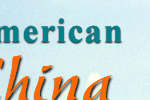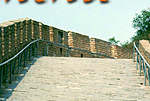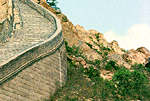 |  |  |  |
 |  |  |  |
 |  |  |  |
 |  |  |  |
|
November 15, 2003 China's MBA Crazeby Sascha Matuszak |
|
I was the basketball coach at the First Annual Chengdu MBA Student Basketball Tournament last week. The four biggest universities in the city (and Sichuan Province for that matter) all fielded teams: Southwest University of Finance and Economics, Southwest Transportation University, University of Electronics and Technology and Sichuan University. I coached Sichuan University's team and we lost by 6 points. There was a DJ and banners, cheerleaders and dancers, gawking locals, four dignitaries representing the four universities and more than 250 MBA students. Most of these students are already working in companies or own their own little enterprise – my most promising student owns a prosperous hot pot restaurant. At the Fourth Annual MBA Forum in Shanghai last October, 76 different MBA schools from all over the world were present to discuss the future of the degree in China. An MBA degree holds great value in this Land of Merchants. University degrees in China do not always prepare one for life's challenges, being based almost solely on tests, but a degree from a large university, such as Shanghai's Tongji, Beijing's Qinghua or even Chengdu's Sichuan University can open doors that remain tightly shut for more able students from less prestigious universities. As with most things in China, appearances are God. If one carries an MBA into the interview, the job is virtually locked down. Another informal survey of my students and those of the other universities that I had time to speak with came up with "higher salary" as the main impetus for enrolling in an MBA program. Reforming the banking system, realizing more efficient management techniques, comprehending finance and the stock market were hardly mentioned. The knowledge is less important than the degree. This is understandable. I doubt many American MBA students deviate from this line of thinking. Foreign schools are making deep inroads in the MBA sector. Since the first program in 1991 in Shanghai, universities have reached into the hinterlands and set up programs in such "internationally acclaimed" cities as Chongqing and Chengdu. The University of Electronic Science and Technology has at least three different programs with three different schools: Webster, University of Illinois and the Terry College of Business. The Odette College of business is up in there as well, but they don't have a program as of yet. There are currently more than 80,000 Chinese students studying for their MBA and the number will grow. The Webster program costs $8,000 and it ranks as one of the more expensive in the country! The Chinese universities are considerably cheaper and offer (perhaps) a less stimulating education, but an MBA is an MBA. Chinese white collars working in the growing Chinese private sector have little need for a foreign professor to teach them about finance. In fact, the views of a foreigner who may or may not have spent time in China may be quite useless in an economy such as China's, which resembles the United States during the fat cat years at the turn of the century. I took a bus ride with Professor Tischler of the University of Scranton, who just finished teaching Intro to Management at Beijing University. He was taking his son down the Yangtze to see the Three Gorges and he expressed admiration for his students, who seemed to have mastered his course and then implemented certain aspects of it at their own companies with great success. "The US doesn't know what's coming at them," he said. A MERCHANT EMPIRE Maybe they do, maybe they don't. Regardless, as recent developments in Southeast Asia – most notably Indonesia – show, the US doesn't regard the rise of a Merchant Empire in East Asia to be a threat large enough to derail the single-minded policy of military alliances. SE Asia has been labeled a terrorist hotbed by officials and not a few journalists, but other than Bali and the barefoot fellows hiding in the jungles of the Philippines, there doesn't seem to be much violence that can be directly or indirectly linked to an Al-Qaeda-led Muslim uprising. So, in steps China carrying a briefcase of string-less economic incentives and wearing that oh-so-comforting smile. The US doesn't seem to grasp that only tyrants like Saddam would rather buy weapons than food for his people. (Funny how those East Bloc countries are required to spend big money on arms deals with American companies prior to entering NATO.) Maybe the Asians are tired of war and strife and would rather emulate China's relatively peaceful and stable rise from dogma-ridden pariah to economic power. NOT JUST ASIA Aside from boosting development in SE Asia, China has been and is continuing to lug the briefcase around Latin America. For 50 years the US has been slapping around Cuba, intervening on the side of the bad guys in most every Latin American conflict, bringing the hated IMF in to settle disputes over deregulation and privatization and waging a "war" in Colombia. NAFTA did a great job of forcing more and more Mexicans to make a run for the border, to a country that may or may not accept them as the hard-working labor force they are. In steps China with contracts and plans to develop Havana's culinary and tourism industry, Guyana's telecom infrastructure and Brazil's electronic sector, to name a few. Incidentally, a Chinese company also levies a toll on the Panama Canal. AN ARMY OF MANAGERS The US might not really know what is going to hit them, all the textbooks, theories and faculty that the US has to offer in the field of business is being eagerly swallowed up by a generation of young Chinese very determined to be rich. While these young men and women spend their days and nights studying and dreaming about money, the US offers grants and scholarships for those young Americans who want to be part of the national security bureaucracy. –Sascha Matuszak
Please Support Antiwar.comSend contributions to Antiwar.com or
Contribute Via our Secure Server Your contributions are now tax-deductible
|
Sascha Matuszak
is a teacher living and working in China. His articles have appeared
in the South China Morning Post, the Minnesota Daily,
and elsewhere. His exclusive Antiwar.com column (usually) appears
Fridays. Archived columns Anti-Fools
of the World Unite! To
'Patriotic Fervor and National Cohesion' Chinese
Big Bosses Rule – with the Backing of Beijing Mao
Exonerated – by Chinese Capitalism Let's
Hope Nobody Calls the US's Bluff The
Best Possible Course for North Korea Crouching
China, Paper Tiger Democracy
with Chinese Characteristics Powers
Behind the Thrones Know
When to Lie, Know When to Shoot Straight Rumors
and Leavetakings 'Americans
Like War, Huh?' A
Beautiful Morning for a War Soft
Power Moves Abroad The
Safest Place in the World Smiles
and Nods and Handouts China:
Straddling the Fence Just Right Merry
Christmas from China Don't
Believe the Hype Jiang's
Theory Is a Smokescreen 'We
Make You Play Bad Card' The
Future of East-West Rapprochement Tiananmen's
Legacy: The Forgotten Rebellion Deciphering
the Chinese Smile Why
China Can Disregard US Anger Arming
the World: What the US Fears 1.3
Billion Problems For China China's
New Post-9/11 Status
Sweep 'Em Off the Streets
Chinese Embrace Progress China's
Afghan Agenda New
War May Reveal New Superpower, Part II New
War May Reveal New Superpower A
Chance for a New Friendship? Cheating
as a Way of Life China's
Internet Generation Free
Markets or Supermarkets Sailing
Towards World Significance China's
Youth Revolution |
